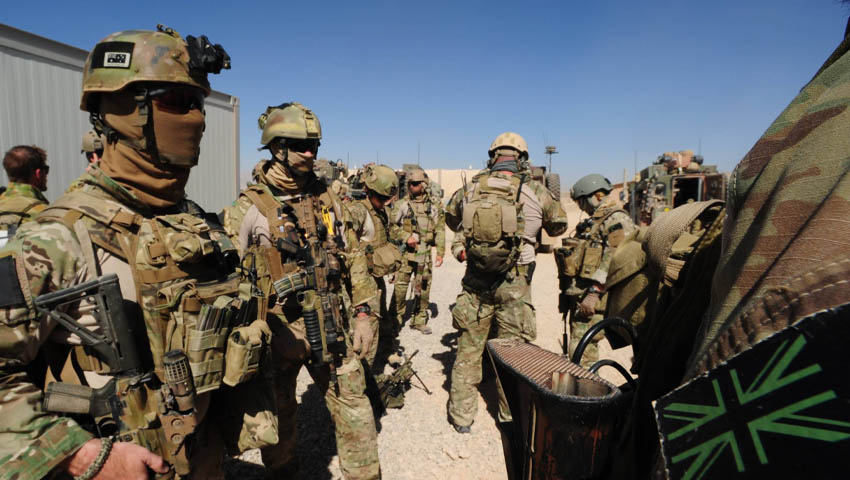The rise of asymmetric threats backed by state and non-state actors is challenging conventional force structures. Australia’s Special Forces are internationally recognised as some of the world's best non-conventional fighting forces – does the rise of hybrid warfare asymmetric threats mean Australia’s special operators will take on a different role?
To continue reading the rest of this article, please log in.
Create free account to get unlimited news articles and more!
The occupation of the Crimea in 2014 sparked international condemnation as the world responded to renewed Russian aggression, however, it wasn’t the might of the Russian Army that led the invasion and occupation, rather it was a combination of special forces, local insurgents acting as a fifth column and a collection of international mercenaries, giving rise to a dangerous new form of proxy conflict and power projection.
While asymmetric combat operations have typically been the realm of guerrilla forces like al-Qaeda, Hezbollah, Islamic State, the Viet Cong and Narco-terrorists, the successful deployment of asymmetric forces by Russia to annex strategic locations in the Ukrainian-held Crimea dramatically reshaped the world of asymmetric warfare.
Like traditional guerrilla warfare, hybrid warfare has evolved to leverage irregular methods of combat to counter a conventionally superior fighting force, negating a number of tactical and strategic advantages ranging from precision fire, air support, armoured vehicles and overwhelming infantry.
The US Joint Forces Command defines a hybrid threat as "any adversary that simultaneously and adaptively employs a tailored mix of conventional, irregular, terrorism and criminal means or activities in the operational battle space. Rather than a single entity, a hybrid threat or challenger may be a combination of state and non-state actors".
Special Operations Forces (SOF) have served as powerful tactical and strategic force multipliers throughout history. Modern SOF came to prominence during the Second World War with the advent of organisations like the British Special Air Service, Special Boat Service, Royal Marine Commandos, US Army Rangers and Australia's own Force Z – SOF became potent and permanent components of contemporary armed forces around the world.
The asymmetric skills of SOF proved their worth in combat operations during the Vietnam conflict and more recently against asymmetric forces in Afghanistan, Iraq and the broader Middle East. However, Australia and its allies are not alone in their use of the tactical and strategic force multiplier capabilities of SOF – potential peer competitors, like Russia, China, Iran and North Korea, have used SOF to enhanced their 'hybrid warfare' operations.
Direct action hard power application
For Australia, SOF like the SASR, 2nd Commando and the Navy's Clearance Diving Teams and Air Force's No. 4 Squadron form the core of the nation's Special Operations Command – providing Australian strategic and political decision makers with a precise, scalpel-like force for asymmetric operations including counter-insurgency, counter-terrorism, clandestine intelligence, surveillance and reconnaissance (ISR) and direct action combat operations.
Australia's SOF also provide a range of training and capability development options for the nation – with recent examples in the Middle East and south-east Asia, particularly in response to the rising threat of violent religious extremism in the southern Philippines. Australia's support of the Philippines and ongoing commitments to countering the spread of violent extremism at home and abroad, particularly throughout south-east Asia is forcing the nation to dramatically rethink the way it engages with these asymmetric threats.
This shifting focus and responsibility of Australia's Special Operations community given the increasing prominence of hybrid conflicts, asymmetric threats and 'gray warfare' was identified by Chief of the Defence Force, General Angus Campbell, during an address to the Australian Strategic Policy Institute's (ASPI) 'War in 2025' conference, which focused on the increased threat posed by state and non-state based actors and raised an important question – is it time for Australia's Special Operations Command to become a separate branch of the broader Australian Defence Force?
The role of Special Forces in the face of 'hybrid warfare'
Interestingly, in the era of 'fake news' hybrid forces have sought to leverage the power of the internet and social media to serve as a powerful force multiplier, enabling the spread of propaganda, terror, influencing political outcomes and, as Islamic State successfully demonstrated, recruitment in an increasingly globalised world.
As an increasingly powerful tool of modern statecraft, hybrid warfare has been used successfully by both the US and one of its major rivals, Russia, to effectively influence and occupy territories or conduct proxy wars in order to further broaden national interests in geo-strategically important parts of the world.
The implementation of such doctrines has resulted in both American and Russian authorities accusing one another of conducting such operations to hinder the influence and effectiveness of their significant conventional capabilities as well as undermining the security of both nations.
Special Operations Forces, combined with increasingly clandestine intelligence operations, are serving as powerful tools in countering the effectiveness of non-state supported hybrid warfare opponents, however, should a hostile state-based actor wish to influence and support such actors in the region, the response of both Australia and its regional and global allies would be significantly hindered.
Hybrid warfare is serving as a potent tool for both traditional state and non-state actors seeking to blur the distinctions between traditional concepts of 'hard' and 'soft' power, enabling such actors to dramatically influence regional and global events in an increasingly cost-effective and timely manner.
While traditional 'hard' power methods of power projection form a key component of contemporary hybrid warfare, the growing prominence of cyber warfare capabilities, combined with political influence peddling and lobbying, are all serving to raise questions about the strength of democracy and the walls that protect it both in Australia and across the world.
Get involved with the discussion and let us know your thoughts on how Australia could respond to the evolving threat of hybrid warfare in the comments section below, or get in touch with

 Login
Login







